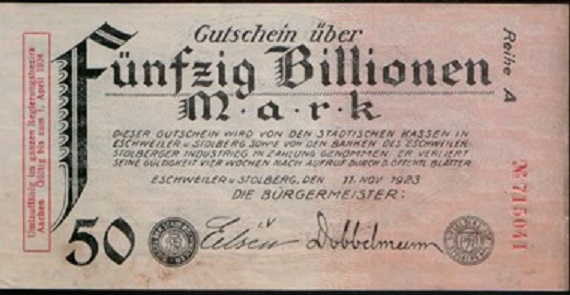Your home isn’t an investment. Before you start emailing me your Zestimate® and talking about all your “gains”, I’ll concede that 2008 would’ve been a better time to make this argument. After all, the index that tracks national home prices (Case-Shiller) is pushing all time highs. There’s a guy in Austin, TX who offered to buy the seller’s next house. A $275,000 fixer-upper in DC had 88 offers in four days, 76 of which, were all cash. The state of the housing market is about as crazy as the AMC CEO offering his Robinhood investors free popcorn through the summer. You’d be forgiven for asking yourself, “what is going on!?!”
Despite the state of the real estate market, I still maintain that your home isn’t an investment. Notice I didn’t say real estate, but your home. Hear me out.
Continue reading
In the early 1900s, the Weimer Republic (Germany) spent $33 billion to fund their war efforts in WW1, when one US dollar could be exchanged for about 5 marks (their currency). As part of the fallout from losing the war, The Treaty of Versailles demanded reparations from Germany which only accelerated the devaluation of the mark. By 1919, you would need 48 marks to buy one US dollar. In early 1921, you would need 90 marks to buy one dollar. And by the end of the year, you would need 330. Downward spiral.
In order to satisfy the reparation payments, Germany started the mass printing of money, which started a period of hyperinflation. By the fall of 1922, the German mark was, for all intents and purposes, worthless. A loaf of bread that cost 160 marks in 1922 cost 200 billion marks by the end of 1923. And a single dollar was worth 4.2 trillion German marks. Yes, you read that right, four trillion marks for one US dollar. Just devastating.
Continue reading
Never play monopoly. This is an important lesson I learned last year over the holidays with my in-laws. The first few rounds are always the same. Accumulate property. Build. Repeat. Occasionally go to jail. But as the game drags on, wealth becomes concentrated, players file bankruptcy, and rules become flexible. Before I knew it, I’m still playing monopoly, but my father-in-law and wife were building some sort of Parker Brothers conglomerate by consolidating their real estate holdings.
It’s all in good fun, but a helpful reminder that sometimes, we aren’t all playing the same game. In this two-part series, we will evaluate the current spending in Washington, its impact on national debt, and repercussions that may follow.
Continue reading

While we have left some things behind in 2020, we’ve seen a continuation of certain trends and fads move with us into the new year. While the darling of Wall Street continues to be SPACs, or special purpose acquisition companies, bitcoin and other cryptocurrencies continue to move higher led by institutions and companies beginning to drink the Kool-Aid.
Tesla announced in early February that it had invested $1.5 billion in bitcoin for “more flexibility to further diversify and maximize returns on our cash”, according to their SEC filings. There has also been speculation surrounding Apple, and potential investment they may make in bitcoin or other cryptocurrencies with their $200 billion cash on hand. The interest in bitcoin and crypto extends beyond the private sector and is starting to bleed into local governments. Miami Mayor Francis Suarez has requested that city commissioners study the use of cryptocurrencies for some of its financial transactions, including employees opting to receive crypto as part of their salary. It’s safe to say that bitcoin, and cryptocurrencies broadly, have some staying power.
Continue reading





